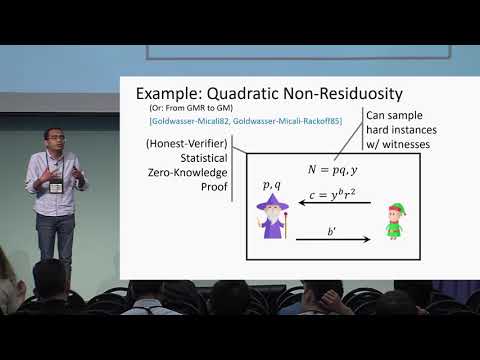Welcome to the resource topic for 2018/548
Title:
From Laconic Zero-Knowledge to Public-Key Cryptography
Authors: Itay Berman, Akshay Degwekar, Ron D. Rothblum, Prashant Nalini Vasudevan
Abstract:Since its inception, public-key encryption (PKE) has been one of the main cornerstones of cryptography. A central goal in cryptographic research is to understand the foundations of public-key encryption and in particular, base its existence on a natural and generic complexity-theoretic assumption. An intriguing candidate for such an assumption is the existence of a cryptographically hard language in the intersection of NP and SZK. In this work we prove that public-key encryption can be based on the foregoing assumption, as long as the (honest) prover in the zero-knowledge protocol is efficient and laconic. That is, messages that the prover sends should be efficiently computable (given the NP witness) and short (i.e., of sufficiently sub-logarithmic length). Actually, our result is stronger and only requires the protocol to be zero-knowledge for an honest-verifier and sound against computationally bounded cheating provers. Languages in NP with such laconic zero-knowledge protocols are known from a variety of computational assumptions (e.g., Quadratic Residuocity, Decisional Diffie-Hellman, Learning with Errors, etc.). Thus, our main result can also be viewed as giving a unifying framework for constructing PKE which, in particular, captures many of the assumptions that were already known to yield PKE. We also show several extensions of our result. First, that a certain weakening of our assumption on laconic zero-knowledge is actually equivalent to PKE, thereby giving a complexity-theoretic characterization of PKE. Second, a mild strengthening of our assumption also yields a (2-message) oblivious transfer protocol.
ePrint: https://eprint.iacr.org/2018/548
Talk: https://www.youtube.com/watch?v=XAyAP2QguII
Slides: https://crypto.iacr.org/2018/slides/28803.pdf
See all topics related to this paper.
Feel free to post resources that are related to this paper below.
Example resources include: implementations, explanation materials, talks, slides, links to previous discussions on other websites.
For more information, see the rules for Resource Topics .
